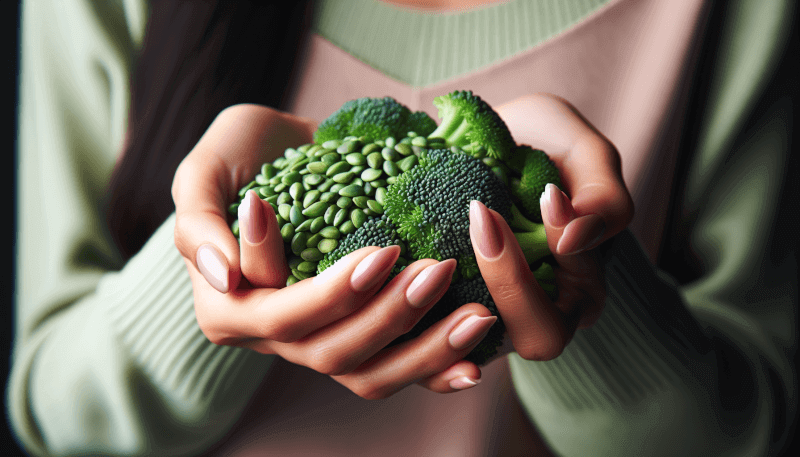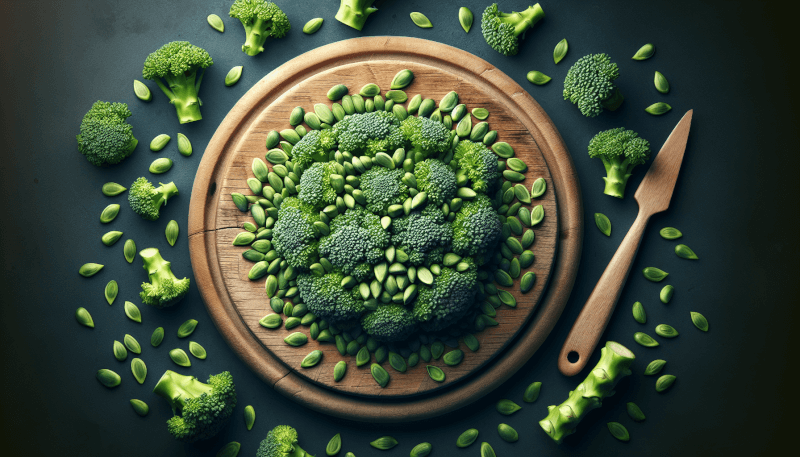👋 Click the mic button to talk to Alfred, the Todd's Seeds Gardening/Sprouting Expert – Feel free to ask him anything!
Ask Virtual Todd Anything - Click the Mic
Are you aware of the hidden treasure that lies within broccoli seeds? While broccoli florets are commonly consumed for their nutritional value, the seeds are often overlooked. However, these small but mighty seeds actually possess a plethora of health benefits that can significantly improve your well-being. From aiding in digestion to bolstering your immune system, the various advantages of broccoli seeds are truly remarkable. So why not embark on a journey of exploration and discover the incredible potential that lies within these tiny green gems?

Nutritional Benefits
High in Vitamin C
Broccoli seeds are packed with vitamin C, a powerful antioxidant that can boost your immune system and help protect your body against harmful free radicals. Consuming foods rich in vitamin C, like broccoli seeds, can promote skin health, improve iron absorption, and support collagen production.
Rich in Fiber
Fiber is an essential nutrient for maintaining a healthy digestive system. Broccoli seeds are an excellent source of fiber, which can help to regulate bowel movements, promote satiety, and support overall gut health. Including broccoli seeds in your diet can aid in preventing constipation and maintaining a healthy weight.
Excellent Source of Vitamin K
Vitamin K plays a crucial role in blood clotting and bone health. Broccoli seeds are an excellent source of vitamin K, which is essential for ensuring proper blood coagulation and reducing the risk of excessive bleeding. Additionally, vitamin K is important for bone metabolism and may help prevent osteoporosis.
Packed with Antioxidants
Antioxidants are compounds that protect your cells from damage caused by free radicals. Broccoli seeds are rich in antioxidants, such as sulforaphane and glucoraphanin. These antioxidants have been shown to have anti-inflammatory and anticancer properties, making them a valuable addition to your diet.
Good Source of Folate
Folate, also known as vitamin B9, is necessary for the production of DNA and RNA, as well as for cell division and growth. Broccoli seeds are a good source of folate, making them a beneficial food for pregnant women, as folate is crucial for fetal development and can help prevent birth defects.
Potential Health Benefits
May Help Support Digestive Health
The high fiber content in broccoli seeds can promote a healthy digestive system by preventing constipation and supporting regular bowel movements. Additionally, the antioxidants in broccoli seeds may help reduce inflammation in the gut, further supporting digestive health.
Could Lower Cholesterol Levels
Research suggests that consuming broccoli seeds may help lower cholesterol levels. The fiber and antioxidants in broccoli seeds may work together to reduce the absorption of cholesterol from your diet and promote its excretion. By including broccoli seeds in your meals, you can potentially improve your cardiovascular health by maintaining healthy cholesterol levels.
May Enhance Heart Health
Several components in broccoli seeds contribute to heart health. The fiber content helps regulate blood pressure, while the antioxidants help reduce inflammation and oxidative stress, both of which are risk factors for heart disease. Incorporating broccoli seeds into your diet can support overall heart health and reduce the risk of cardiovascular problems.
Could Aid Weight Loss
If you’re on a weight loss journey, broccoli seeds can be a valuable addition to your diet. The high fiber content can help you feel full, reducing your overall calorie intake. Additionally, the antioxidants in broccoli seeds may promote fat burning and help regulate blood sugar levels, further supporting weight loss efforts.
Potential Cancer-Fighting Properties
Broccoli seeds contain compounds like sulforaphane and glucoraphanin, which have been shown to have potent anticancer properties. These compounds can help inhibit the growth of cancer cells, reduce inflammation, and support detoxification processes in the body. While more research is needed, including broccoli seeds in your diet may contribute to reducing the risk of certain types of cancer.
Broccoli Sprouts vs. Broccoli Seeds
What are Broccoli Sprouts?
Broccoli sprouts are the young, tender shoots that grow from broccoli seeds. They are typically harvested a few days after germination and are known for their intense flavor and high nutritional value. Broccoli sprouts are an excellent source of vitamins, minerals, and antioxidants.
How to Grow Broccoli Sprouts
Growing broccoli sprouts at home is a simple and rewarding process. To grow broccoli sprouts, you will need broccoli seeds, a sprouting jar or tray, and water. Simply soak the seeds in water, then transfer them to the sprouting jar or tray. Rinse the seeds twice a day and watch as they develop into sprouts within a week.
Healthy Nutrients in Broccoli Sprouts
Broccoli sprouts are incredibly rich in nutrients. They are particularly high in sulforaphane, a potent antioxidant that has been linked to various health benefits, including detoxification, cancer prevention, and anti-inflammatory effects. Broccoli sprouts also contain vitamins A, C, and K, as well as fiber and minerals like potassium and calcium.
Broccoli Seeds vs. Broccoli Sprouts
While both broccoli seeds and broccoli sprouts offer numerous health benefits, they have some key differences. Broccoli seeds are the mature form of the plant and are often consumed for their nutritional value. On the other hand, broccoli sprouts are harvested at an early stage and are prized for their concentrated nutrient content. Both options can be incorporated into a healthy diet, depending on your preferences.
How to Incorporate Broccoli Seeds into Your Diet
Sprinkle on Salads or Soups
One of the easiest ways to include broccoli seeds in your diet is by sprinkling them on salads or soups. They add a delightful crunch and a nutty flavor to your dishes while providing a nutritional boost. Try tossing a handful of broccoli seeds on top of your favorite salad or adding them to a bowl of hot soup for an extra dose of vitamins and minerals.
Blend into Smoothies
If you enjoy smoothies, try adding a tablespoon of ground broccoli seeds to your blend. This will not only enhance the nutritional value of your smoothie but also add a mild, earthy flavor. Combine broccoli seeds with your choice of fruits, vegetables, and liquid for a refreshing and wholesome beverage.
Use in Baking Recipes
Broccoli seeds can be used in baking recipes as a nutritious and flavorful ingredient. Ground broccoli seeds can be added to bread, muffins, or granola bars to increase their fiber and nutrient content. They can also be incorporated into homemade energy balls or protein bars for a healthy and satisfying snack.
Add to Trail Mix
For a quick and nutritious snack on the go, mix broccoli seeds with your favorite nuts, dried fruits, and whole-grain cereals to create a delicious trail mix. This combination provides a balanced blend of carbohydrates, protein, and healthy fats, making it an ideal choice for busy days or outdoor activities.
Make Broccoli Seed Butter
Similar to other types of seed butter, broccoli seed butter can be a tasty and nutritious spread for your toast, crackers, or sandwiches. Simply blend roasted broccoli seeds with a touch of oil until you achieve a smooth, creamy consistency. The resulting broccoli seed butter is packed with healthy fats, fiber, and essential nutrients.

Precautions and Potential Side Effects
Digestive Issues
While broccoli seeds are generally safe to consume, they can cause digestive issues in some individuals. The high fiber content may lead to bloating, gas, or an upset stomach, especially if consumed in large quantities. It’s important to start with small amounts and gradually increase your intake to allow your body to adjust.
Allergic Reactions
Individuals with a known allergy to cruciferous vegetables, such as broccoli and cabbage, may also be allergic to broccoli seeds. If you experience symptoms like itching, hives, or difficulty breathing after consuming broccoli seeds, it’s best to avoid them and seek medical advice.
Interaction with Medications
If you are taking specific medications, it’s essential to consult with your healthcare provider before incorporating broccoli seeds into your diet. Broccoli seeds contain compounds that can interact with certain medications, such as blood thinners, and may affect their effectiveness. Your healthcare provider can provide personalized advice based on your specific situation.
Choosing and Storing Broccoli Seeds
Selecting High-Quality Seeds
When selecting broccoli seeds, look for seeds that are fresh, plump, and free from damage or signs of mold. High-quality seeds will have a higher germination rate and are more likely to yield healthy sprouts or plants. Consider purchasing organic broccoli seeds to minimize exposure to pesticides and ensure the highest possible nutrient content.
Proper Storage Techniques
To maximize the shelf life of broccoli seeds, store them in a cool, dry place, away from moisture and direct sunlight. Airtight containers, such as glass jars or sealed bags, are ideal for maintaining seed quality. Properly stored broccoli seeds can remain viable for up to several years, allowing you to enjoy their health benefits for an extended period.
FAQs about Broccoli Seeds
How long do broccoli seeds last?
Properly stored broccoli seeds can last for several years. However, it’s best to check the expiration date on the seed packet and use them within the recommended timeframe for optimal germination and quality.
Can broccoli seeds be eaten raw?
While broccoli seeds can be eaten raw, they have a tough exterior that may be difficult to chew. Grinding or blending the seeds into a powder or incorporating them into recipes can make them more palatable and easier to digest.
Can broccoli seeds be roasted?
Yes, broccoli seeds can be roasted for a delicious and crunchy snack. Simply spread them on a baking sheet, drizzle with a little oil, and season with your favorite spices. Roast in the oven at around 375°F (190°C) for about 10-15 minutes, or until golden brown and crispy.
Are broccoli seeds safe for children?
Broccoli seeds are generally safe for children to consume. However, it’s essential to introduce them in small amounts and monitor for any adverse reactions. As with any new food, it’s always a good idea to consult with a pediatrician if you have any concerns.
Can broccoli seeds be sprouted in a jar?
Yes, broccoli seeds can be sprouted in a jar using the same method as growing broccoli sprouts. Soak the seeds, transfer them to a sprouting jar, rinse twice a day, and watch as they develop into nutritious sprouts within a week. Sprouted broccoli seeds can be enjoyed in salads, sandwiches, or as a garnish for various dishes.
Conclusion
Broccoli Seeds: A Nutritional Powerhouse
Broccoli seeds are a nutritional powerhouse, packed with vitamins, minerals, fiber, and antioxidants. Including broccoli seeds in your diet can provide numerous health benefits, such as supporting digestive health, lowering cholesterol levels, enhancing heart health, aiding weight loss, and potentially fighting cancer. Whether you choose to enjoy broccoli seeds as sprouts, incorporate them into your meals, or use them in baking recipes, they can be a valuable addition to a well-rounded and nutritious diet.
Incorporate Broccoli Seeds for Optimal Health
By incorporating broccoli seeds into your daily meals and snacks, you can harness their nutritional benefits and support your overall health and well-being. From sprinkling them on salads and blending them into smoothies to using them in baking recipes and making seed butter, there are endless ways to enjoy the goodness of broccoli seeds. Remember to start with small amounts, properly store your seeds, and consult with your healthcare provider if you have any concerns. Embrace the power of broccoli seeds and take a step towards optimal health.